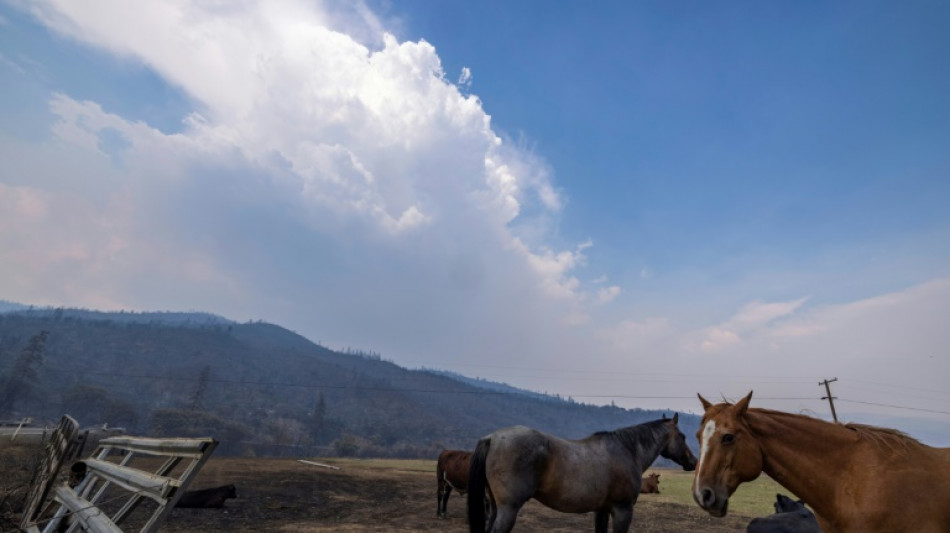
-
 Lewandowski injury confirmed in blow to Barca quadruple bid
Lewandowski injury confirmed in blow to Barca quadruple bid
-
Russia and Ukraine accuse each other of breaching Easter truce

-
 Zimbabwe bowl Bangladesh out for 191 in first Test in Sylhet
Zimbabwe bowl Bangladesh out for 191 in first Test in Sylhet
-
Ukrainians voice scepticism on Easter truce

-
 Pope wishes 'Happy Easter' to faithful in appearance at St Peter's Square
Pope wishes 'Happy Easter' to faithful in appearance at St Peter's Square
-
Sri Lanka police probe photo of Buddha tooth relic

-
 Home hero Wu wows Shanghai crowds by charging to China Open win
Home hero Wu wows Shanghai crowds by charging to China Open win
-
Less Soviet, more inspiring: Kyrgyzstan seeks new anthem

-
 Defending champion Kyren Wilson crashes out in first round of World Snooker Championship
Defending champion Kyren Wilson crashes out in first round of World Snooker Championship
-
NASA's oldest active astronaut returns to Earth on 70th birthday

-
 Exec linked to Bangkok building collapse arrested
Exec linked to Bangkok building collapse arrested
-
Zelensky says Russian attacks ongoing despite Putin's Easter truce

-
 Vaibhav Suryavanshi: the 14-year-old whose IPL dream came true
Vaibhav Suryavanshi: the 14-year-old whose IPL dream came true
-
Six drowning deaths as huge waves hit Australian coast

-
 Ukrainian soldiers' lovers kept waiting as war drags on
Ukrainian soldiers' lovers kept waiting as war drags on
-
T'Wolves dominate Lakers, Nuggets edge Clippers as NBA playoffs start

-
 Taxes on super rich and tech giants stall under Trump
Taxes on super rich and tech giants stall under Trump
-
Star Wars series 'Andor' back for final season

-
 Neighbours improvise first aid for wounded in besieged Sudan city
Neighbours improvise first aid for wounded in besieged Sudan city
-
Tariffs could lift Boeing and Airbus plane prices even higher

-
 Analysts warn US could be handing chip market to China
Analysts warn US could be handing chip market to China
-
Unbeaten Miami edge Columbus in front of big MLS crowd in Cleveland

-
 Social media helps fuel growing 'sex tourism' in Japan
Social media helps fuel growing 'sex tourism' in Japan
-
'Pandora's box': alarm bells in Indonesia over rising military role

-
 Alaalatoa hails 'hustling hard' Brumbies for rare Super Rugby clean sheet
Alaalatoa hails 'hustling hard' Brumbies for rare Super Rugby clean sheet
-
Trio share lead at tight LA Championship

-
 Sampdoria fighting relegation disaster as old heroes ride into town
Sampdoria fighting relegation disaster as old heroes ride into town
-
Recovering pope expected to delight crowds at Easter Sunday mass

-
 Nuggets edge Clippers in NBA playoff overtime thriller, Knicks and Pacers win
Nuggets edge Clippers in NBA playoff overtime thriller, Knicks and Pacers win
-
Force skipper clueless about extra-time rules in pulsating Super Rugby draw

-
 DEA MARIJUANA SCAM: As DEA Cannabis Program Implodes This 4/20, MMJ Stands Alone in Pursuit of Real Medicine
DEA MARIJUANA SCAM: As DEA Cannabis Program Implodes This 4/20, MMJ Stands Alone in Pursuit of Real Medicine
-
Nuggets edge Clippers in NBA playoff overtime thriller, Pacers thump Bucks

-
 Unbeaten Miami edge Columbus in front of big crowd in Cleveland
Unbeaten Miami edge Columbus in front of big crowd in Cleveland
-
Kim takes one-shot lead over Thomas, Novak at RBC Heritage

-
 Another round of anti-Trump protests hits US cities
Another round of anti-Trump protests hits US cities
-
'So grateful' - Dodgers star Ohtani and wife welcome first child

-
 PSG maintain unbeaten Ligue 1 record, Marseille back up to second
PSG maintain unbeaten Ligue 1 record, Marseille back up to second
-
US, Iran report progress in nuclear talks, will meet again

-
 US Supreme Court intervenes to block Trump deportations
US Supreme Court intervenes to block Trump deportations
-
Hamas armed wing says fate of US-Israeli captive unknown

-
 Pacers thump Bucks to open NBA playoffs
Pacers thump Bucks to open NBA playoffs
-
Sabalenka reaches Stuttgart semis as Ostapenko extends Swiatek mastery

-
 Zelensky says Ukraine will observe Putin's Easter truce but claims violations
Zelensky says Ukraine will observe Putin's Easter truce but claims violations
-
'Fuming' Watkins fires Villa in bid to prove Emery wrong

-
 DR Congo boat fire toll revised down to 33
DR Congo boat fire toll revised down to 33
-
England thrash Scotland to set up France Grand Slam showdown

-
 Verstappen's Red Bull 'comes alive' to claim record pole in Jeddah
Verstappen's Red Bull 'comes alive' to claim record pole in Jeddah
-
McTominay fires Napoli level with Inter as Conte fuels exit rumours

-
 Rajasthan unleash Suryavanshi, 14, as youngest IPL player but lose thriller
Rajasthan unleash Suryavanshi, 14, as youngest IPL player but lose thriller
-
Man City boost top five bid, Aston Villa thrash in-form Newcastle


Horses part of Native American life earlier than thought: study
Native American people integrated horses into their communities much earlier than European colonial records suggest, according to an innovative study Thursday that combined archaeological and genetic analysis with Indigenous oral traditions.
The study is the first using both Western science and traditional knowledge to be published in the prestigious Science journal, the researchers said.
Based on European records from colonial times, historians have long contended that Native American people did not interact much with horses in the American West until the late 1600s.
Scholars often say the turning point was the Pueblo Revolt of 1680, when Indigenous people staged an uprising against Spanish colonisers in what is now New Mexico, releasing many European horses in the process.
However the new research, which traces the spread of horses from the American Southwest into the Great Plains and Rocky Mountains regions, contradicts this widely accepted theory.
The team analysed hundreds of horse remains using radiocarbon dating, DNA sequencing and other tools to demonstrate that the animals had spread widely across the American West in the early 1600s.
They also showed that the horses were raised, received veterinary care, and used for transport by Indigenous communities during that time.
This meant that horses were part of Native American social and ceremonial traditions "before any documented European presence in the Rockies or the Central Plains," the study said.
- 'Historic' -
The findings are consistent with a range of Indigenous oral histories that have long challenged the European account.
"Before this study, there was literally no place for Indigenous peoples in the Americas, or the horses we lived alongside and protected, in this conversation," said Yvette Running Horse Collin, a member of the Oglala Lakota Nation and co-author of the paper.
"This is due to the systems put in place by colonisation," she told a press conference in the southern French city of Toulouse.
Rather than one "scientific system dominating another," the research showed that "science can be utilised to heal and to unite rather than divide," she added.
William Taylor, an archaeologist at the University of Colorado and the study's first author, said that "a myopic, narrow focus on European perspectives has unfortunately limited our understanding collectively of the integration of horses into Indigenous societies".
Ludovic Orlando, a study co-author and paleogeneticist at France's national scientific research centre CNRS, said the research was "historic".
"We've brought traditional science to the cover" of Science, he told the press conference.
- 'Mutual language' -
While horses are known to have inhabited the Americas more than 12,000 years ago, Orlando said there is an "absence of fossils" between that time and the 1600s, the reason for which is not known.
The fossils from the 1600s covered by the research had Spanish or Portuguese ancestry, genetic analysis showed.
That would "fit well with acquisition from the conquistadors," Orlando said, adding that the discovery of more fossils could disprove this theory.
Orlando, who has previously used genetic analysis to disprove longstanding theories about the history of horses, was contacted by Lakota researchers in 2018.
Running Horse Collin then moved to the south of France for two years to work at the Centre for Anthropobiology and Genomics of Toulouse.
"I, as an Oglala Lakota scientist, was not asked to change my methods, methodology and conclusions," she said.
Orlando said that different theoretical approaches sometimes led him to reflect on how he communicated, which "was really not easy at several moments".
But he said they found "a mutual language" and intend to continue their scientific collaboration.
Study co-author Carlton Shield Chief Gover, a member of the Pawnee Nation, said in a statement that admiration for horses extends across borders.
"We can talk to one another through our shared love of an animal," he said.
L.Durand--AMWN



